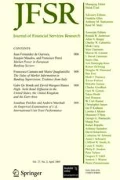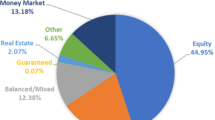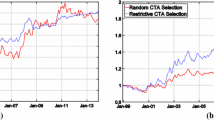Abstract
In this paper, we analyze the performance persistence and survivorship bias of Islamic funds. The remarkable growth of these types of ethical funds raises the question of how non-financial attributes, including beliefs and value systems, influence performance and its persistence. A procedure commonly used in prior literature to assess persistence is the measuring of the performance of investment strategies based on past performance. In this context, we propose a refined version of this methodology that controls the cross-sectional significance of the performance of these strategies. This procedure correctly identifies whether abnormal performance is due to a dynamic investment strategy based on past performance, or whether it is obtained by investing in a particular set of mutual funds. The significance of the persistence varies depending on the time horizon (yearly/half-yearly), survivorship, or the tail of the distribution. In particular, we find that persistence only exists for the best funds, whereas for the worst funds, the results are not significant.

Similar content being viewed by others
Notes
Shari’ah-compliant assets avoid Shari’ah prohibited companies such as those dealing with alcohol, tobacco, arms, biotechnology for human cloning, and companies with heavy debt financing to avoid dealing with interest.
It is considered discriminatory and unfair, by Islamic standards, to charge a fixed rate of interest on an investment loan. This is because the entrepreneur, or borrower, accepts the full risk, while the lender receives the set amount, whether or not the venture is successful. In contrast, the lender, when the profit is very high, will gain a relatively smaller portion of the profit. The borrower gains the greater portion, which implies that there has been an uneven sharing of both profit and risk (Novethic 2009).
Unless the firm exceeds the financial ratio (such as gearing) thresholds.
References
Abdelsalam O, Duygun M, Matallín-Sáez JC, Tortosa-Ausina E (2014a) Do ethics imply persistence? The case of Islamic and socially responsible funds. J Bank Finance 40:182–194
Abdelsalam O, Fethi MD, Matallín JC, Tortosa-Ausina E (2014b) On the comparative performance of socially responsible and Islamic mutual funds. J Econ Behav Organ 103:S108–S128
Abdullah F, Hassan T, Mohamad S (2007) Investigation of performance of malaysian islamic unit trust funds: Comparison with conventional unit trust funds. Manag Finance 33(2):142–153
Ahmad Z, Ibrahim H (2002) A study of performance of the KLSE Shariah Index. Malays Manag J 6:25–34
Ahmed A (2010) Global financial crisis: an Islamic finance perspective. Int J Islam Middle East Finance Manag 3(4):306–320
Alam N, Tang KB, Rajjaque MS (2013) A comparative performance of conventional and Islamic unit trusts: Market timing and persistence evidence. J Financ Serv Mark 18(4):316–326
Albaity M, Ahmad R (2008) Performance of Syariah and composite indices: evidence from bursa malaysia. Asian Acad Manag J Account Finance 4(1):23–43
Askari H, Iqbal Z, Krichene N, Mirakhor A (2010) The Stability of Islamic Finance. Wiley Finance. Wiley, Singapore
Avramov D, Wermers R (2006) Investing in mutual funds when returns are predictable. J Financ Econ 81(2):339–377
Barber B, Odean T (2001) Boys will be boys: Gender, overconfidence, and common stock investment. Q J Econ 141:261–292
Barberis N, Thaler R (2003 ) A survey of behavioral finance. In: Constantinides GM, Harris M, Stulz R (eds) Handbook of the Economics of Finance, vol 1. Elsevier, Amsterdam, pp 1053–1128
Barras L, Scaillet O, Wermers R (2009) False discoveries in mutual fund performance: Measuring luck in estimated alphas. J Financ 65(1):179–216
Bauer R, J Derwall J, Otten R (2007) The ethical mutual fund performance debate: New evidence from Canada. J Bus Ethics 70:111–124
Bauer R, Koedijk K, Otten R (2005) International evidence on ethical mutual fund performance and investment style. J Bank Finance 29(7):1751–1767
BinMahfouz S, Hassan MK (2012) A comparative study between the investment characteristics of Islamic and conventional equity mutual funds in Saudi Arabia. J Invest 21(4):128–143
Bollen N, Busse J (2005) Short-term persistence in mutual fund performance. Rev Finance Stud 18(2):569–597
Brown S, Goetzmann W, Ibbotson R, Ross S (1992) Survivorship bias in performance studies. Rev Finance Stud 5(4):553–580
Brown SJ, Goetzmann WN (1995) Performance persistence. J Finance 50:679–698
Busse JA, Clifton GT, Klaas B (2007) Fund managers who take big bets: skilled or overconfident. In: AFA 2007 Chicago Meetings Paper, available at SSRN: http://ssrn.com/abstract=891727
Busse JA, Goyal A, Wahal S (2010) Performance and persistence in institutional investment management. J Finance 65(2):765–790
Carhart MM (1997) On persistence in mutual fund performance. J Finance 52 (1):57–82
Carhart MM, Carpenter JN, Lynch AW, Musto DK (2002) Mutual fund survivorship. Rev Finance Stud 15(5):1439–1463
Cohen RB, Coval JD, Pástor L (2005) Judging fund managers by the company they keep. J Finance 60(3):1057–1096
Cuthbertson K, Nitzsche D, O’Sullivan N (2008) UK mutual fund performance: Skill or luck?. J Empir Finance 15(4):613–634
Deaves R (2004) Data-conditioning biases, performance, persistence and flows: The case of Canadian equity funds. J Bank Finance 28(3):673–694
Derigs U, Marzban S (2008) Review and analysis of current Shariah-compliant equity screening practices. Int J Islam Middle East Finance Manag 1(4):285–303
Dharani M, Natarajan P (2011) Equanimity of risk and return relationship between Shari’ah index and general index in India. J Econ Behav Stud 2(5):213–222
Elton EJ, Gruber MJ, Blake CR (1996) The persistence of risk-adjusted mutual fund performance. J Bus 69(2):133–157
Elton EJ, Gruber MJ, Das S, Hlavka M (1993) Efficiency with costly information: A reinterpretation of evidence from managed portfolios. Rev Financ Stud 6(1):1–22
Ernst & Young (2011) Islamic Funds & Investments Report 2011: Achieving Growth in Challenging Times
Fama EF, French KR (1993) Common risk factors in the returns on stocks and bonds. J Financ Econ 33(1):3–56
Fama EF, French KR (2010) Luck versus skill in the cross-section of mutual fund returns. J Finance 65(5):1915–1947
Girard EC, Hassan MK (2008) Is there a cost to faith-based investing: Evidence from FTSE Islamic indices. J Invest 17(4):112–121
Godlewski CJ, Turk-Ariss R, Weill L (2013) Sukuk vs. conventional bonds: A stock market perspective. J Comp Econ 41(3):745–761
Goetzmann WN, Ibbotson RG (1994) Do winners repeat?. J Portfolio Manag 20(2):9–18
Grinblatt M, Titman S (1992) The persistence of mutual fund performance. J Finance 47(5):1977–1984
Grinblatt M, Titman S (1993) Performance measurement without benchmarks: An examination of mutual fund returns. J Bus 66(1):47–68
Grinold R (1989) The fundamental law of active portfolio management. J Por 15:30–37
Grinold R, Kahn R (2000) Active portfolio management: A quantitative approach for producing superior returns and controlling risk. McGraw-Hill, New York
Hashim N (2008) The ftse global islamic and the risk dilemma. Working Paper Series 2008-08. American International University, Office of Research and Publications (ORP), Bangladesh
Hayat R, Kraeussl R (2011) Risk and return characteristics of Islamic equity funds. Emerg Mark Rev 12(2):189–203
Hendricks D, Patel J, Zeckhauser R (1993) Hot hands in mutual funds: Short-run persistence of relative performance, 1974-1988. J Finance 48(1):93–130
Hiagh M, Hazelton J (2004) Financial markets: A tool for social responsibility. J Bus Ethics 52(1):59–71
Hoepner AGF, Rammal HG, Rezec M (2011) Islamic mutual funds’ financial performance and international investment style: evidence from 20 countries. Eur J Finance 17(9-10):829–850
Huij J, Derwall J (2011) Global equity fund performance, portfolio concentration, and the fundamental law of active management. J Bank Finance 35(1):155–165
Indro DC, Jiang CX, Hu MY, Lee WY (1999) Mutual fund performance: does fund size matter?. Financ Anal J 55(3):74–87
Jensen MC (1968) The performance of mutual funds in the period 1945–1964. J Finance 23:389–416
Kacperczyk M, Sialm C, Zheng L (2005) On the industry concentration of actively managed equity mutual funds. J Finance 60(4):1983–2011
Kacperczyk M, Van Nieuwerburgh S, Veldkamp L (2009) Rational attention allocation over the business cycle, Cambridge, MA
Kempf A, Ruenzi S, Thiele T (2009) Employment risk, compensation incentives, and managerial risk taking: Evidence from the mutual fund industry. J Financ Econ 92 (1):92–108
Khorana A (2001) Performance changes following top management turnover: Evidence from open-end mutual funds. J Financ Quantit Anal 36(03):371–393
Kosowski R (2011) Do mutual funds perform when it matters most to investors? US mutual fund performance and risk in recessions and expansions. Q J Finance 1 (3):607–664
Kosowski R, Timmermann A, Wermers R, White H (2006) Can mutual fund “stars” really pick stocks? New evidence from a bootstrap analysis. J Finance 61 (6):2551–2595
Lynch AW, Musto DK (2003) How investors interpret past fund returns. J Finance 58(5):2033–2058
Malkiel BG (1995) Returns from investing in equity mutual funds 1971 to 1991. J Finance 50(2):549–572
Mansor F, Bhatti I (2011) Risk and return analysis on performance of the Islamic mutual funds: evidence from Malaysia. Glob Econ Finance J 4(1):19–31
Massa M, Patgiri R (2009) Incentives and mutual fund performance: Higher performance or just higher risk taking?. Rev Financ Stud 22:1777–1815
Novethic (2009) Islamic finance and SRI: any crossover?
Otten R, Bams D (2004) How to measure mutual fund performance: economic versus statistical relevance. Account Finance 44(2):203–222
Puetz A, Ruenzi S Overconfidence among professional investors: Evidence from mutual fund managers. J Bus Finance Account 38(5-6):684–712
Quigley G, Sinquefield R (2000) Performance of UK equity unit trusts. J Asset Manag 1(1):72–92
Renneboog L, Ter Horst J, Zhang C (2011) Is ethical money financially smart? Nonfinancial attributes and money flows of socially responsible investment funds. J Financ Int 20(4):562–588
Rohleder M, Scholz H, Wilkens M (2011) Survivorship bias and mutual fund performance: Relevance, significance, and methodical differences. Rev Finance 15 (2):441–474
Sauer DA (1997) The impact of social-responsibility screens on investment performance: Evidence from the Domini 400 Social Index and Domini Equity Mutual Fund. Review of Financial Economics 2:137–149
Shanmugam B, Zahari Z (2009) A primer on Islamic finance. Research foundation publications, CFA Institute, Charlottesville
Sharpe WF (1992) Asset allocation: management style and performance measurement. J Portfolio Manag 18(2):7–19
Sun Z, Wang A, Zheng L (2013) Only when the tide goes out: Downside returns and hedge fund performance. Working paper, SSRN. Available at SSRN. doi:10.2139/ssrn.2249033
Webley P, Lewis A, Mackenzie C (2001) Commitment among ethical investors: an experimental approach. J Econ Psychol 22:27–42
Wermers R (2003) Is money really ‘smart’? New evidence on the relation between mutual fund flows, manager behavior, and performance persistence. Available at SSRN: abstract414420
Author information
Authors and Affiliations
Corresponding author
Additional information
We thank an anonymous referee, the co-editor, Sanjiv Das, and the editor, Haluk Ünal, whose comments helped greatly in the overall improvement of the article, as well as those by Mohamed Shaban on a preliminary version. Juan Carlos Matallín and Emili Tortosa-Ausina acknowledge the financial support provided by Ministerio de Economía y Competitividad (ECO2014-55221-P), Universitat Jaume I (P1·1B2012-07 and P1·1B2014-17) and Generalitat Valenciana (PROMETEOII/2014/046). All authors are grateful to El Shaarani Centre for Islamic Business and Finance at Aston Business School for financially supporting this project.
Rights and permissions
About this article
Cite this article
Abdelsalam, O., Duygun, M., Matallín-Sáez, J.C. et al. Is Ethical Money Sensitive to Past Returns? The Case of Portfolio Constraints and Persistence in Islamic Funds. J Financ Serv Res 51, 363–384 (2017). https://doi.org/10.1007/s10693-015-0234-x
Received:
Revised:
Accepted:
Published:
Issue Date:
DOI: https://doi.org/10.1007/s10693-015-0234-x




